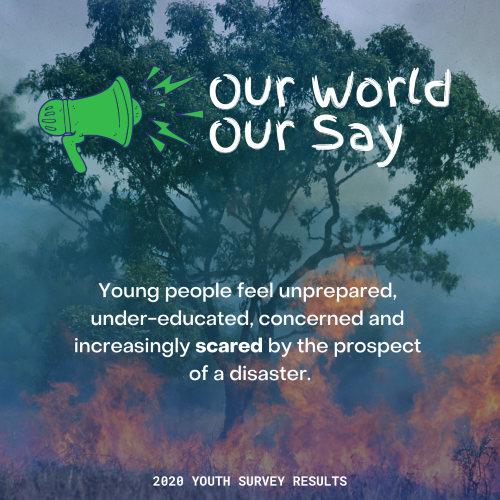
Australian youth feel unprepared for disasters like bushfires, saying schools are failing to arm them with the skills they need, and politicians are not listening to their climate change concerns, a major report has found.
The Our World, Our Say report released today reveals that while youth are increasingly frightened by the spectre of disasters, a staggering 88 per cent believe they are not being taught enough to protect themselves and their communities.
The research was conducted in the wake of Australia’s devastating ‘Black Summer’ bushfire season, finding young people learned more about earthquakes in class than more relevant hazards like bushfires, floods, drought and tropical cyclones.
The nation’s most comprehensive consultation of children and youth on climate change, disasters and disaster-resilience involved the polling of almost 1500 children aged 10-24. It was led by the Australian Institute for Disaster Resilience and World Vision Australia, with the support of UNICEF Australia, Plan International, Save the Children, Oaktree and Australian Red Cross.
Overwhelmingly, survey respondents wanted politicians to give them a voice on climate change and disaster risk, with nearly 90 per cent saying they did not feel heard by leaders in government.
Young people were deeply worried about climate change, but most felt Australia was not doing enough to address it.
Students also said their education had not equipped them with the knowledge needed to prepare for disasters and reduce their impact, even though almost two-thirds (64 per cent) had experienced at least three events such as bushfires, heatwaves and drought in the past three years.
The Our World Our Say survey also found:
AIR pollution has emerged as a significant climate change concern for 76 per cent;
SIXTY-seven per cent don’t believe Australia is doing enough to reduce carbon emissions;
YOUNG people are taking personal action to reduce their environmental impact, with nearly two-thirds (66 per cent) switching to reusable water bottles and coffee cups. Avoiding unnecessary purchases and reducing household waste also rated highly;
MORE than half of participants aged 16 and over have cut their water and electricity usage and opted for greener transport options.
A representative panel of young people helped analyse the survey results, including Maddie Canteri, 17, of Cairns.
She said young people had both the capacity and desire to be powerful agents of change, and their voices on issues like climate change needed to be heard.
“It’s pretty worrying for us, we are already experiencing the effects of climate-related disasters,” she said.
“The youth of Australia are future leaders of Australia, and we have new ideas on how to protect the environment. We see the world in a different light. Politicians need to start listening to us and taking action.”
Maddie, who was involved in a Youth Climate Summit in Cairns this year, said she was most concerned about the impact of climate change on ecological diversity.
The Our World Our Say youth panellists* said in summary that young people felt “unprepared, uneducated, concerned and increasingly scared by the prospect of a natural disaster”, and wanted to “reduce the intensity and frequency of disasters through climate action”.
“We anticipate that we will experience personal impacts from natural hazards in the future, whether we are living in capital cities, regional centres, or rural areas,” they said.
“The 2020 bushfires demonstrated that you need not live in the bush to be affected by a bushfire. We are experiencing these persistent worries while having to contend with life, school, growing up and everything else that comes with being a young person in Australia.”
The report also found young people want decision-makers to accelerate the transition away from fossil fuels to cleaner and renewable energy sources, and to listen to scientists’ advice on climate change.
The survey was conducted in addition to consultation with young people across the Asia-Pacific region. More than 8000 young people from India to the Philippines contributed their voices to a similar survey on climate change and disaster risk reduction.
The report is available at .








